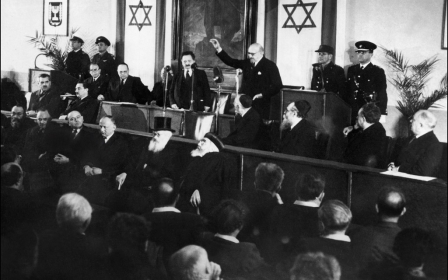Palestinian right of return: The legal key to undoing the Zionist conquest

One of the most ironic features of Zionism and the state of Israel is the central way in which the concept of “return” informs their ideology and policies.
Zionism’s colonial project hinged on the claim that contemporary European Jews were descendants of the ancient Hebrews of Palestine, and that their colonisation plan was nothing but a strategy to “return” Jews to the land of their alleged ancestors after an absence of two millennia. Thus, the concept of “return” was, and remains, the ideological cornerstone of Zionism and the state of Israel.
In the Declaration of the Establishment of the State of Israel, issued in May 1948, the settler-colony’s founders asserted: “After being forcibly exiled from their land, the [Jewish] people kept faith with it throughout their Dispersion and never ceased to pray and hope for their return to it and for the restoration in it of their political freedom … In recent decades they returned in their masses … The state of Israel will be open for Jewish immigration and for the Ingathering of the Exiles.”
UN Resolution 194
This commitment was guaranteed by Israel in issuing the 1950 Law of Return, which secured the right of every Jew worldwide “to come to this country as an oleh [immigrant]”. Meanwhile, Zionist militias expelled the Palestinian people from their homeland, starting in late 1947. By the end of 1948, the year that Israel was created, more than 750,000 Palestinians had been expelled.
New MEE newsletter: Jerusalem Dispatch
Sign up to get the latest insights and analysis on Israel-Palestine, alongside Turkey Unpacked and other MEE newsletters
This compelled the United Nations to issue Resolution 194 in December 1948, stipulating that “refugees wishing to return to their homes and live at peace with their neighbours should be permitted to do so at the earliest practicable date, and that compensation should be paid for the property of those choosing not to return and for loss of or damage to property which, under principles of international law or in equity, should be made good by the Governments or authorities responsible.”
The European Jews' 'right' to return to their alleged 'homeland' could only be realised through colonisation of the homeland of Palestinians
The Israeli government has consistently rejected Resolution 194. In an attempt to challenge the Palestinian right of return, Israel issued its Law of Return for Jews a year and a half after the UN resolution.
The irony is not one that Israel does not recognise the right of refugees to return to their homeland; rather, Israel recognises only the right of Jews - whom it claims, based on its religious and colonial myths, were refugees from Palestine who had lived in exile for 2,000 years - to “return”, while it denies that right to Palestinians, whom it recognises as having been displaced from Palestine.
The basis of this discrepancy is not an Israeli affirmation that Jews were exiled, but that Palestinians were not, or that Palestinians did not originate in Palestine, just as it claims the Jews did.
Rather, the crux of the matter for Israel is its full understanding that international law and the UN guarantee of the right of return for expelled Palestinians negates the right of return that Israel grants to Jews worldwide, and therefore the Jewish right to colonise the homeland of the Palestinians.
Return as colonisation
While Theodor Herzl did not speak of a “return” of the Jews in his 1896 pamphlet The State of the Jews, in his 1902 novel Old-New Land, he emphasised the concept of “return”, which he explicitly coupled with colonisation. This understanding of return-as-colonisation-as-expulsion-of-the-natives was always explicit and never covered up by the early Zionists, who were, after all, writing during the heyday of European colonialism.
In Herzl’s novel, the idea is first articulated by a fictional Eastern European character: “Dr. Weiss, a simple rabbi from a provincial town in Moravia”. Weiss states: “A new movement has arisen within the last few years, which is called Zionism. Its aim is to solve the Jewish problem through colonization on a large scale. All who can no longer bear their present lot will return to our old home, to Palestine.”
By 1923, Vladimir Jabotinsky, the leader of Revisionist Zionism, had laid out the Zionist coupling in his manifesto, The Iron Wall, writing that “when the whole of the civilised world has recognised that Jews have a right to return to Palestine, which means that the Jews are, in principle, also ‘citizens’ and ‘inhabitants’ of Palestine, only they were driven out, and their return must be a lengthy process, it is wrong to contend that meanwhile the local population has the right to refuse to allow them to come back … Palestine consists of two national groups, the local group and these who were driven out, and the second group is the larger.”
Jabotinsky, like Herzl, understood that the so-called “return” of the Jews to Palestine was nothing but colonisation: “There can be no voluntary agreement between ourselves and the Palestine Arabs … it is utterly impossible to obtain the voluntary consent of the Palestine Arabs for converting ‘Palestine’ from an Arab country into a country with a Jewish majority … I suggest that [my readers] consider all the precedents with which they are acquainted, and see whether there is one solitary instance of any colonisation being carried on with the consent of the native population. There is no such precedent.
“The native populations, civilised or uncivilised, have always stubbornly resisted the colonists, irrespective of whether they were civilised or savage.”
Undoing Israel's racist system
In contrast with Palestinians, whose right of return is affirmed in international law and UN resolutions, there are no international documents or laws that guarantee a Jewish “right of return” to Palestine or Israel. Neither the Balfour Declaration of 1917 nor the UN Partition Plan of 1947 spoke of any rights for Jews to "return" to Palestine. Only Israeli ideological claims and Israeli law grants them such a right.
Herein lies the reason why the two rights of return are not symmetrical in Israeli argumentation, any more than they are in international law. It is precisely because the European Jews’ “right” to return to their alleged “homeland” could only be realised through colonisation of the homeland of Palestinians, and Jewish colonisation of Palestinian land could only be realised through the expulsion of indigenous Palestinians and ensuring their inability to ever return home, that a Palestinian right of return would undo the entire Zionist project, which is premised on their expulsion.
Exercising the internationally recognised Palestinian right of return negates the Israeli Jewish “right” to colonise Palestine and annuls the Israeli Law of Return. Israel understands very well that the return of Palestinian refugees and their descendants means nothing short of decolonisation, and the undoing of the racist special status that Israel exclusively grants to Jews.
International law’s understanding of the rights of refugees includes the rights of their descendants to return, something that Israel and pro-Israel forces question as illegitimate. Yet, Israel’s concept of the return of Jews, as later amended in its law of return, allows not only those recognised as Jews to “return” to Israel, but also a non-Jewish “child and a grandchild of a Jew, the spouse of a Jew, the spouse of a child of a Jew and the spouse of a grandchild of a Jew, except for a person who has been a Jew and has voluntarily changed his religion.”
This amendment is in line with Zionism’s initial and permanent conception that the exclusive Jewish “right of return” means the Jewish right to colonise Palestine.
The Bosnian case
Israeli assertions, however, are not shared by the UN or international law.
In addition to the UN’s repeated reassertions of Palestinian refugees’ right of return, the right of return of displaced people was upheld in principle and practice after the Bosnian War. Around half a million refugees and internally displaced persons returned, with international assistance, after the 1995 Dayton Agreement, to their homes in Bosnia, a country of 3.5 million people dominated demographically and politically by members of another ethnic community.
As the Bosnian case clearly demonstrates, the right of return of the refugees trumped the racially separatist policies of local authorities, who sought to continue to control the land of the displaced refugees and to populate it demographically with their own ethnic group, at the expense of the refugees.
International enforcement of the Bosnian refugees’ right of return was based on the well-established right of return of refugees in international law and UN resolutions. Demographic racial separatism had no moral or legal standing whatsoever in enforcing the refugees’ right of return. This remains the case today, with the right of Somali refugees and their descendants to return to their country.
It is this established right that the Trump administration is seeking to undo through its ongoing attempts to destroy UNRWA, the UN agency that aids Palestinian refugees, and to redefine who is or is not a refugee.
With Palestinians outnumbering Jews today across Israeli-occupied Palestine, Israel’s enactment of the nation-state law in July 2018 was engineered to secure racial Jewish supremacy in the country, after Israel’s failure to secure Jewish demographic supremacy.
Colonial settlements
The Israeli conception of rights is not universal, but always particular - indeed, always specific to Jews. It is this particularism that Israel seeks to render compatible with international law’s universalism.
If the universalism of the Palestinian right of return, based on international law and UN resolutions, is undone in favour of the Israeli particularism of a Jewish “right of return” imposed by US and Israeli diktat as the new basis of international law, then the threat of a Palestinian return would be neutralised, and the right to continued Jewish colonisation of Palestine would be guaranteed.
The Palestinian struggle today, therefore, must not waver on the implementation of the Palestinian right of return
The Trump administration’s recent decision affirming that Jewish colonial settlements in Jerusalem, the West Bank and the Golan Heights are not in contravention of international law, is the logical outcome of earlier Israeli and US efforts to deny Palestinians the right of return by redefining who is or is not a refugee.
The Zionist colonisation of Palestine was based on a particularist Jewish right of return-as-colonisation-as-expulsion of Palestinians; in short, it was based on racial supremacy, which justified this alleged right.
The Palestinian struggle today, therefore, must not waver on the implementation of the Palestinian right of return, as this right is the legal key to undoing the Zionist conquest of Palestine in its entirety.
Israel and its US ally understand this very well, which is why they are fighting with all their might to undo it.
The views expressed in this article belong to the author and do not necessarily reflect the editorial policy of Middle East Eye.
Middle East Eye delivers independent and unrivalled coverage and analysis of the Middle East, North Africa and beyond. To learn more about republishing this content and the associated fees, please fill out this form. More about MEE can be found here.








